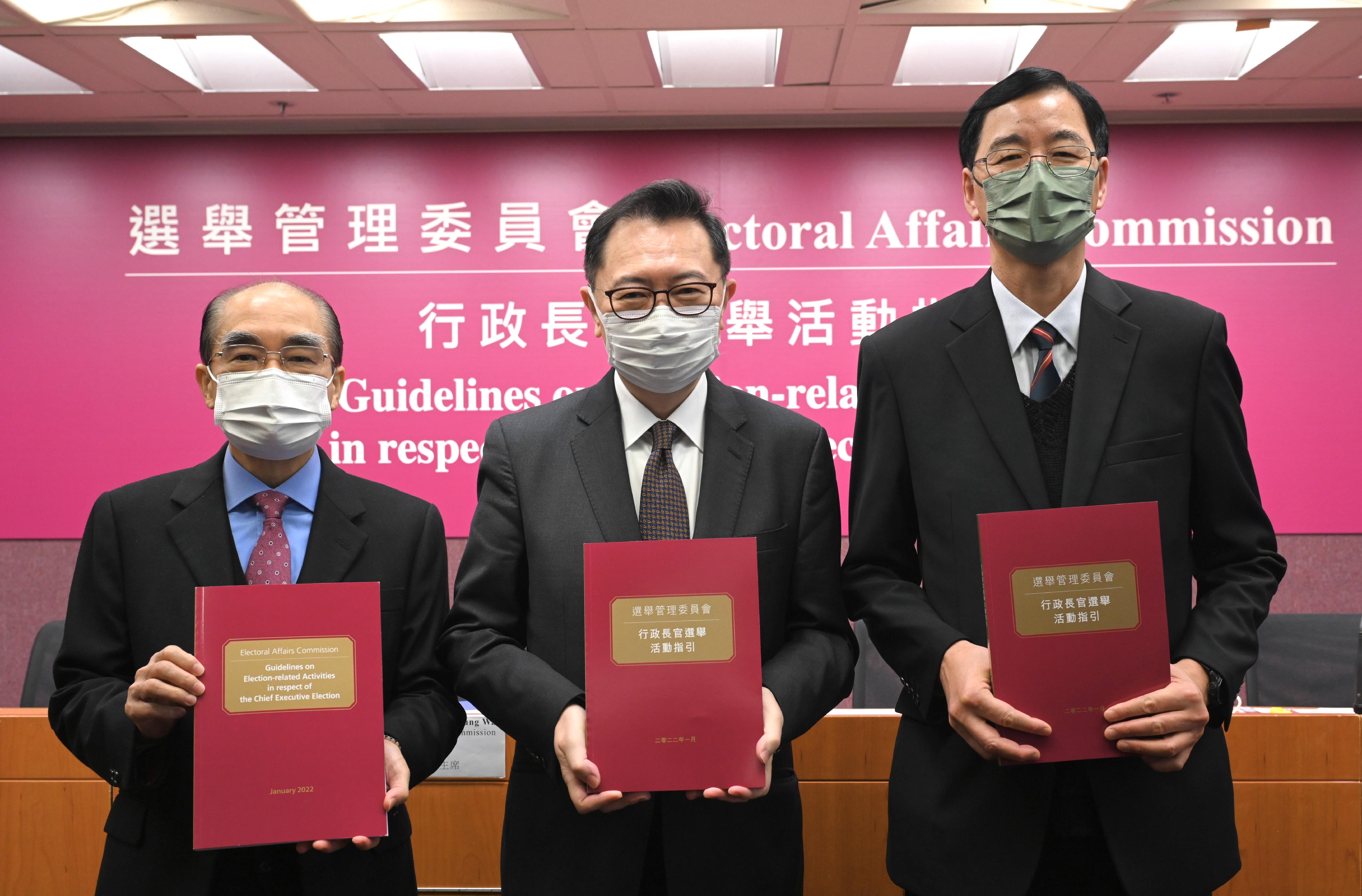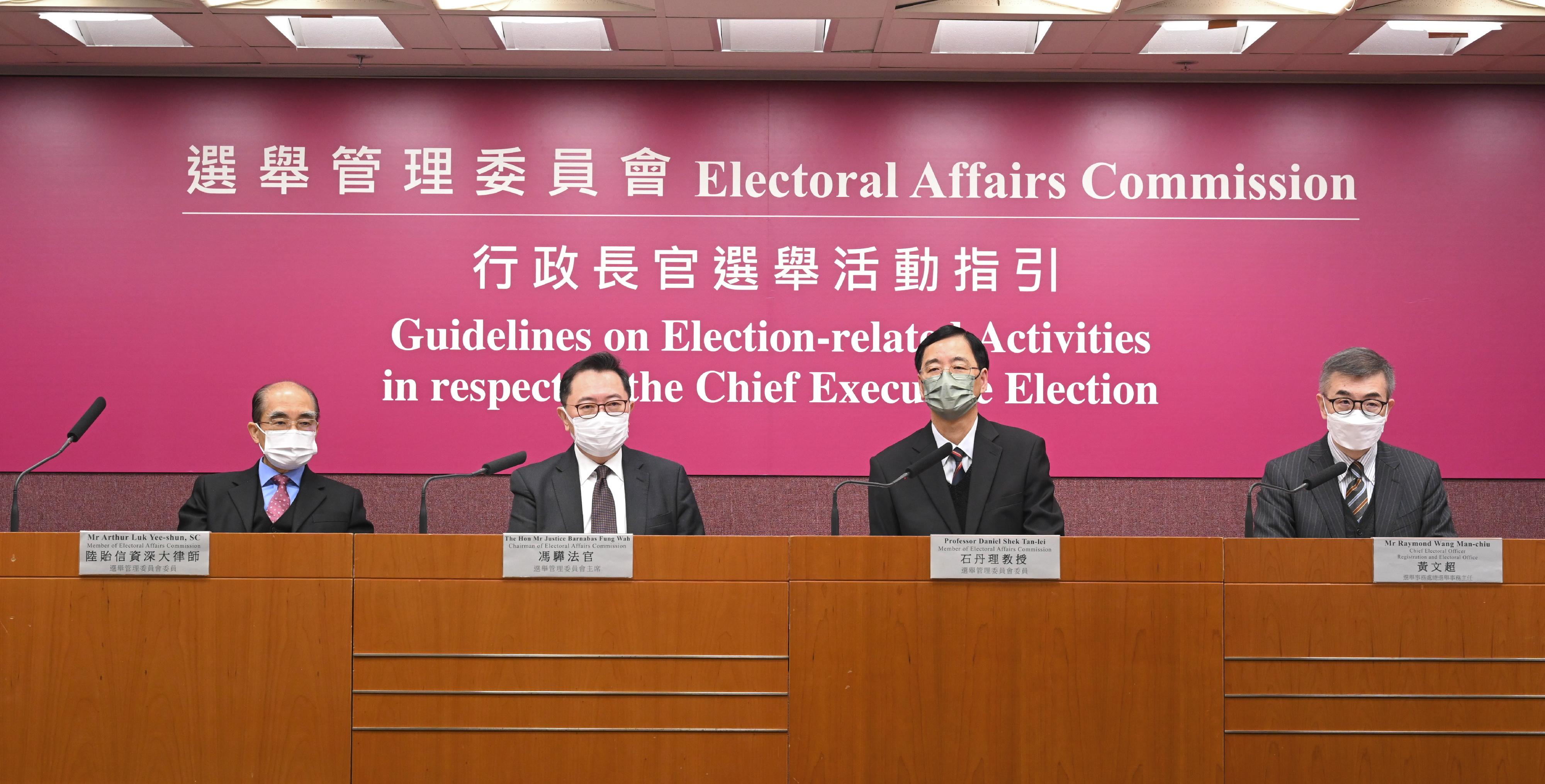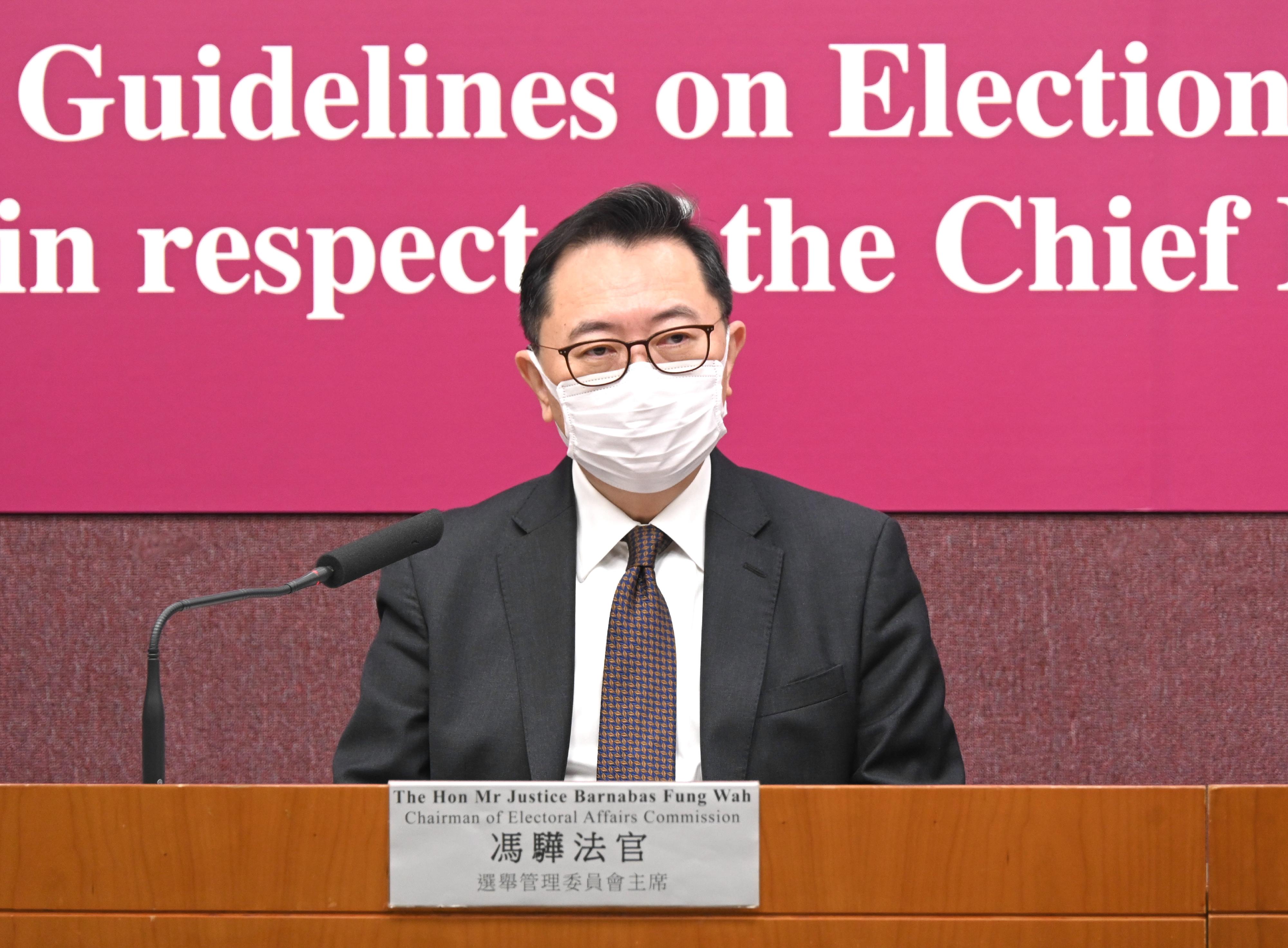Guidelines for Chief Executive Election released today (with photos/video)
**************************************************************************
The Electoral Affairs Commission (EAC) today (January 27) issued the Guidelines on Election-related Activities in respect of the Chief Executive (CE) Election according to the Electoral Affairs Commission Ordinance (Cap. 541).
"The 2022 CE Election will be held on March 27. According to established practices, the EAC will review and update the Guidelines before every election," the EAC Chairman, Mr Justice Barnabas Fung Wah, said at a press conference.
"The Guidelines are prepared on the basis of the edition released in October 2016, with appropriate and necessary amendments. About 50 major amendments are primarily classified into three categories. The first category reflects the amendments to relevant electoral laws, including those under the Improving Electoral System (Consolidated Amendments) Ordinance 2021 (the Ordinance) by the Legislative Council in May last year which covers the method for the selection and the nomination procedures of the CE following the amendment of Annex I and Annex II to the Basic Law by the Standing Committee of the National People's Congress last March. The second category is related to amendments made to align with the other election guidelines including the Guidelines on Election-related Activities in respect of the Election Committee Subsector Elections published last July and the Guidelines on Election-related Activities in respect of the Legislative Council Election published last October. The third category is the elaboration of new electoral arrangements and procedures, such as the arrangement for issuing ballot papers and the polling hours of the second round of voting if necessary. Most of the amendments are under the first and second categories."
Method for selection of CE and nomination of candidate at CE Election
The Ordinance has been published in the Gazette and came into effect on May 31, 2021, with amendments to the method for the selection of the CE and the nomination of candidates in the CE Election.
According to the newly amended electoral laws, the CE shall be elected by the Election Committee (EC) members by secret ballot on a one-person-one-vote basis. A poll would be held in a contested election as well as in an uncontested election. The CE designate must obtain more than 750 valid votes in order to be returned in the election.
A candidate for the office of the CE shall be nominated by not less than 188 EC members, of which the number of members of each of the five EC sectors should not be less than 15. An EC member may nominate only one candidate, and the nomination shall not be withdrawn or revoked.
"The Guidelines also update the conditions for a person to be disqualified from being nominated as a candidate. As stipulated in Annex I to the Basic Law, the Candidate Eligibility Review Committee (CERC) is responsible for reviewing and confirming the eligibility of candidates for the CE Election. The CERC may request the Returning Officer (RO) to provide advice, and also make decisions pursuant to the opinion of the Committee for Safeguarding National Security of the Hong Kong Special Administrative Region."
The nomination period of the 2022 CE Election will run from February 20 to March 5.
Mr Justice Fung elaborated on the polling and counting arrangements for this election.
Polling arrangements
The Registration and Electoral Office (REO) will set up the main polling station at the Hong Kong Convention and Exhibition Centre (HKCEC) for the EC members to cast their vote for the CE Election. A poll will be held irrespective of whether it is a contested election or an uncontested election.
In a contested election, the first round of voting runs from 9am until 11am. A candidate who obtains more than 750 valid votes is elected in the election.
"However, in an election with three or more candidates but no candidate obtaining more than 750 valid votes in the first round of voting, the second round of voting will be conducted. The second round of voting runs from 3pm until 4pm. In principle, the two candidates obtaining the highest number of votes will compete in the second round of voting." Details on the polling arrangements for a contested election can be found in Chapter 4 of the Guidelines.
For an uncontested election in which there is only one validly nominated candidate, the polling hours are from 9am until 11am on March 27. If the candidate obtains more than 750 valid "support" votes, he or she is elected in the election.
"An Electronic Poll Register system will be adopted in the CE Election for verifying electors' identity and issuing ballot papers at the main polling station to increase the efficiency and accuracy in the issuance of ballot papers. EC members should present the original of their Hong Kong permanent identity cards or a specified alternative document according to the law when collecting the ballot papers," Mr Justice Fung said.
Counting arrangements
The central counting station will be set up at the HKCEC. The count will be conducted manually by counting staff in the presence of the candidate(s), or his/her/their election agent(s) or counting agent(s), if they are present. Members of the public and the media may observe the count at the counting station. A notice stating the maximum capacity of the public area will be displayed outside the counting station by the RO. For record purposes, a closed-circuit television system will be installed in the counting station (including the public area) by the REO to record the actual situation.
Epidemic preventive measures
As in the Legislative Council General Election held last December, the REO will implement a number of measures to prevent the spread of COVID-19 in the polling and counting stations.
"Due to the development of the epidemic, apart from complying with various epidemic preventive measures, we encourage EC members to use the 'LeaveHomeSafe' (LHS) mobile application when entering the main polling station to cast their votes. The REO will put up the QR code of the LHS mobile application outside the main polling station. However, it will not affect one's voting rights whether he or she uses the LHS mobile application or not," Mr Justice Fung said.
Except for the exempted persons (i.e. persons aged below 12 or 65 or above, and those with disabilities that render use of the LHS mobile application difficult), all persons entering the central counting station and its media centre, including the public, the media, EC members, candidates and their agents, must use the LHS mobile application.
"EC members who intend to vote but are currently not in Hong Kong should take note of the quarantine arrangements for inbound travellers. They should plan their itinerary as early as possible and allow sufficient time for quarantine arrangements, such as returning to Hong Kong at least 21 days before the polling day, so that they can exercise their voting rights on the polling day."
The REO will continue to liaise with the Food and Health Bureau and the Centre for Health Protection, monitor closely the development of the epidemic, and make assessments on the epidemic situation.
Election advertisements
The Guidelines have adjusted the deadline for candidates to upload the corrected election advertisement (EA) particulars. If the EA particulars posted on the Candidate's Platform or the Central Platform, or submitted to the RO, contain any error, all corrected EA particulars must be posted on the Candidate's Platform or the Central Platform, or submitted to the RO, within three working days after the polling day, which is one day more than the previous two-day limit. Relevant regulations on EAs can be found in Chapter 8 of the Guidelines.
Election expenses
As stipulated in the Maximum Amount of Election Expenses (Chief Executive Election) Regulation (Cap. 554A), the Guidelines specify that the maximum amount of election expenses that can be incurred by a candidate in a CE election has increased from $15.7 million to $17.6 million. It is a criminal offence for a candidate to incur election expenses in excess of the prescribed maximum limit.
The Guidelines also set out that a candidate must submit to the Chief Electoral Officer an election return before the expiry of the period of 60 days, previously 30 days, after the date on which the result of the election is published in the Gazette or the proceedings for the election are declared to have been terminated.
The Guidelines illustrate that, for an incumbent CE seeking re-election for a second term, the subsisting law does not require him/her to resign or take leave before standing for the election. He/she should arrange for the resources himself/herself for his/her electioneering activities. However, if the use for private purposes of any security, transportation, secretarial services and living quarters made available with public resources is unavoidably involved in his/her election activities in certain circumstances because of the continued need to discharge his/her duties as the CE, he/she is required to apportion clearly the use of resources between the two different purposes, i.e. CE duties versus electioneering activities, and to include the relevant items in his/her election expenses and set out the items clearly in the election return.
Claim of support
Mr Justice Fung reminded candidates (including an incumbent CE seeking re-election for a second term) to exercise due care in handling photographs in their EAs. If a candidate includes photographs with the appearance of other persons in their EAs and the publication of that EA implies or is very likely to cause EC members to believe that the candidate has obtained the support of the persons appearing in the photograph, prior written consent from the persons concerned must be obtained by the candidate before the publication of the EA.
He added, "The Guidelines, which are prepared on the basis of the edition released in October 2016, are revised mainly to reflect the legislative amendments under the Ordinance, which have been discussed and passed by the Legislative Council, and to align with the amendments already made to other election guidelines. Therefore, we consider that there is no need to conduct public consultation on the Guidelines. The REO had submitted the advance copy of the Guidelines to the Legislative Council in mid-October last year, and made some amendments in view of the opinions of members."
The Guidelines can be downloaded from the EAC website (www.eac.hk) and viewed at the REO and the Home Affairs Enquiry Centres of the District Offices.
Ends/Thursday, January 27, 2022
Issued at HKT 11:30
Issued at HKT 11:30
NNNN







